Is your feline companion experiencing bouts of vomiting yellow or greenish-yellow foam and showing signs of lethargy? If so, it’s possible that your cat is throwing up bile – a digestive fluid produced in the liver and stored in the gallbladder. Witnessing this can be alarming, leaving you wondering what could be causing it.
There are several reasons why your cat may be throwing up bile for days, and understanding them is crucial to providing appropriate treatment. From dietary changes to medical conditions, there are various causes of bile vomiting in cats.
In this blog post, we will delve into the most common causes of why your cat may be throwing up bile. These include dietary indiscretion, hairballs, and medical conditions such as gastrointestinal disorders, liver disease, and pancreatitis. Furthermore, we will provide you with effective tips and tricks to help prevent and manage bile vomiting in cats.
As a responsible pet owner, it’s vital to stay vigilant about any changes in your cat’s behavior or health. Recognizing the signs that something may be wrong with their digestive system can help you take proactive measures towards their well-being. By understanding the causes of bile vomiting and taking appropriate steps to help your furry friend feel better, you can ensure they remain happy and healthy for years to come.
Common Causes of Cats Throwing Up Bile for Days
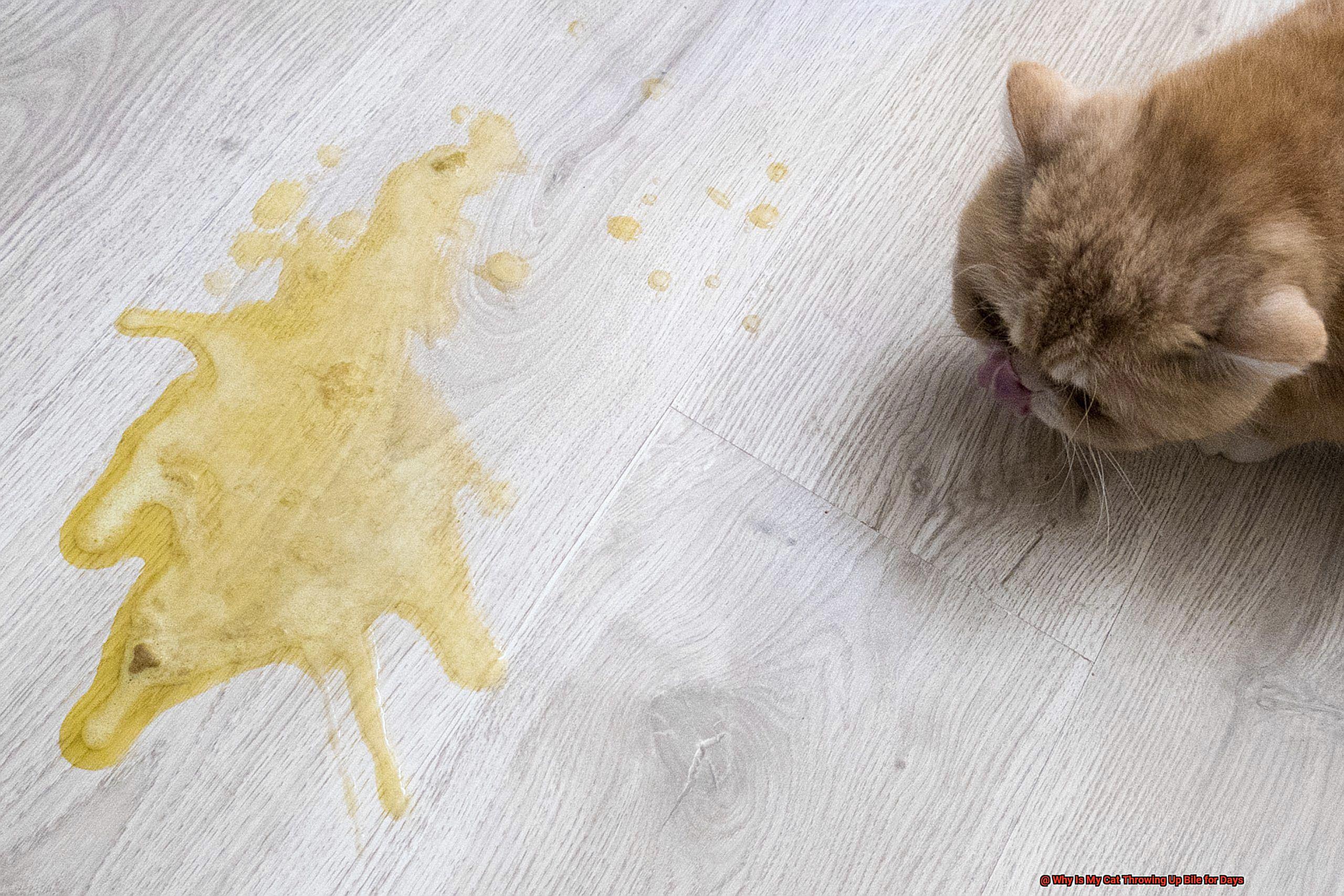
Bile is a yellowish-green liquid that aids in the digestion of fat and is produced in the liver and stored in the gallbladder. If your cat is vomiting bile, it could indicate a deeper issue with their digestive system. Here are some of the most common causes of cats throwing up bile for days:
One of the most frequent culprits is hairballs. Cats are famous for their grooming habits and can often swallow a significant amount of hair. When this hair accumulates in their stomach, it can cause them to vomit repeatedly.
Another cause could be an underlying medical condition such as pancreatitis, kidney disease, or inflammatory bowel disease (IBD). These conditions can cause inflammation in the digestive tract, leading to vomiting and diarrhea.
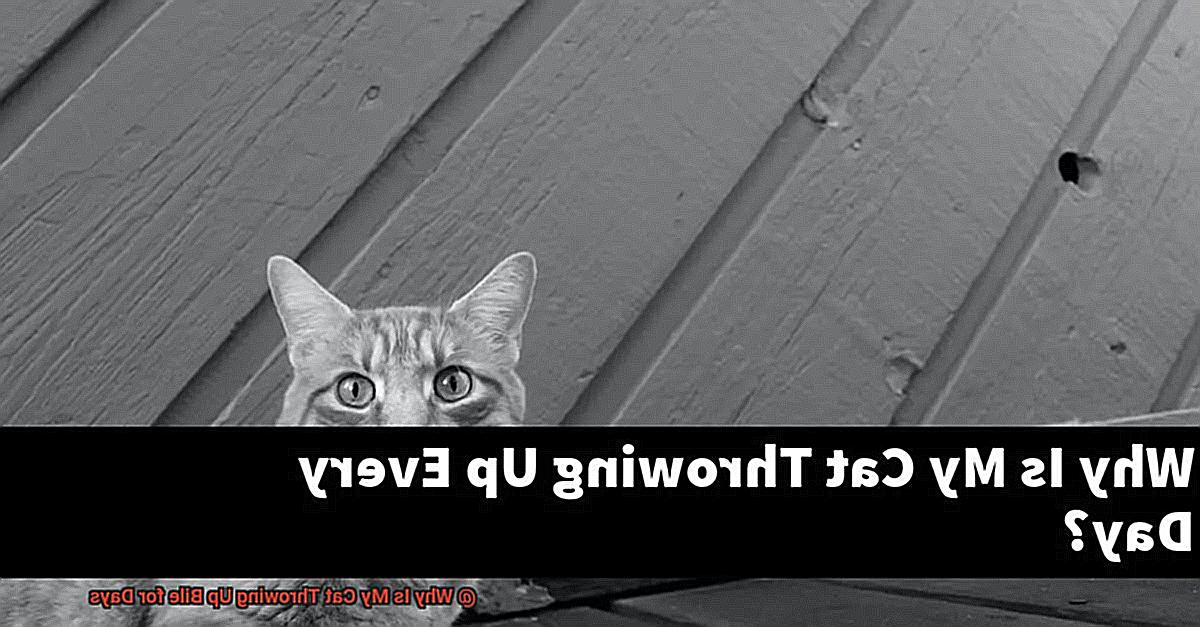
Liver disease is another possible cause of vomiting yellow bile. Moreover, an intestinal blockage caused by ingesting something they shouldn’t have can lead to vomiting and other symptoms.
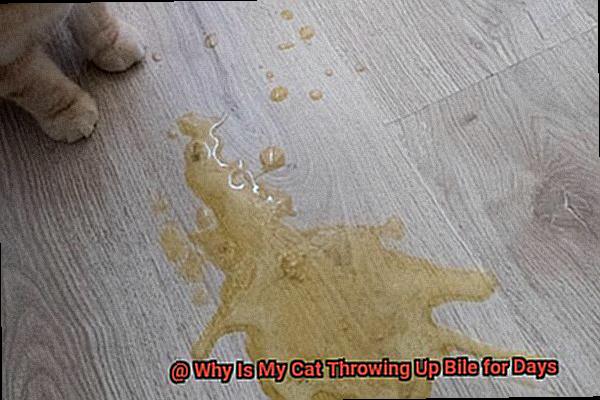
In some cases, diet may also play a role. Cats are obligate carnivores, meaning they require a high-protein diet to stay healthy. If your cat isn’t getting enough protein or if their food isn’t being digested correctly, it can lead to vomiting bile.
If you notice your cat throwing up bile for days, it’s essential to take them to the veterinarian as soon as possible. Your vet will perform a comprehensive physical examination and may order blood tests, x-rays, or ultrasound to determine the underlying cause of your cat’s vomiting.
Depending on the diagnosis, treatment may involve medication, dietary changes, or even surgery. By providing prompt medical attention to your furry friend, you can ensure their well-being and prevent further complications.
In conclusion, don’t ignore any persistent vomiting with bile from your cat – it could be a sign of an underlying health issue. By taking your cat to the veterinarian, you can get to the root of the problem and provide your feline with the necessary care to ensure their health and happiness.
How to Diagnose the Underlying Cause of Your Cat’s Vomiting
It can be alarming to see your furry friend vomiting bile for days on end. Prolonged vomiting can lead to dehydration and other health complications, making it crucial to identify the underlying cause of your cat’s vomiting. Seeking prompt veterinary care is essential when you notice your cat throwing up yellow bile or undigested food repeatedly for days.
This will help diagnose any underlying medical conditions and provide the necessary treatment and care to prevent further complications.
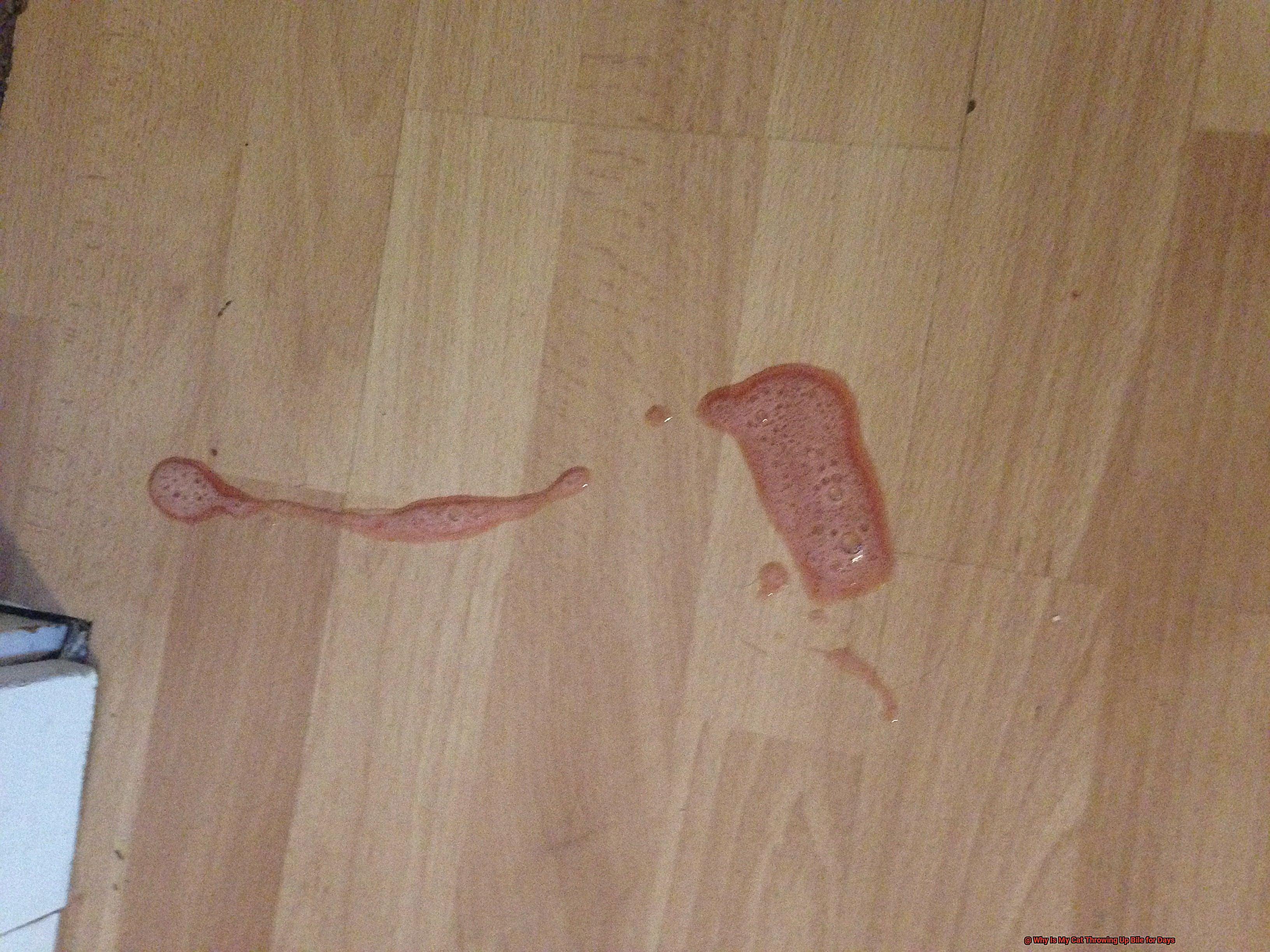
Visiting the Veterinarian for a Comprehensive Diagnosis
When you take your cat to the veterinarian, they will perform a comprehensive physical exam and may recommend diagnostic tests such as blood work, x-rays, ultrasounds, or biopsies to get a better understanding of your cat’s condition.
It is important to provide the veterinarian with detailed information about your cat’s symptoms, such as when the vomiting started, how often it occurs, and whether there are any other accompanying signs such as diarrhea or lethargy.
This information will help narrow down potential causes and develop an appropriate treatment plan for your furry friend.
Common Causes of Vomiting in Cats
There are various reasons why a cat may be throwing up bile for days. One common reason is dietary issues, such as a high-fat diet or not enough protein in their food. However, vomiting can also be due to underlying medical conditions such as pancreatitis, kidney disease, or inflammatory bowel disease (IBD). These conditions can cause inflammation in the digestive tract, leading to vomiting and diarrhea. Identifying the underlying cause of vomiting is essential in providing proper treatment and care.
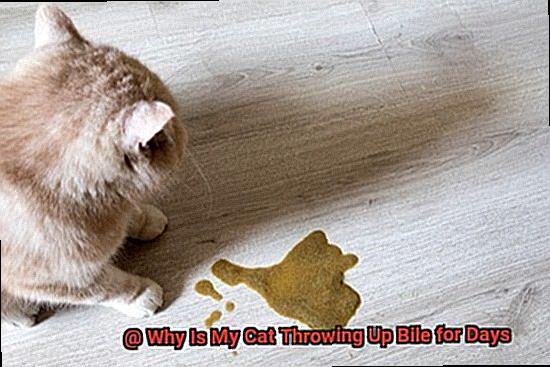
Treatment Options for Vomiting in Cats
The treatment for vomiting in cats depends on the underlying cause of the condition. In some cases, dietary changes may be necessary, such as switching to a bland diet or prescription food recommended by the veterinarian. Medications may also be prescribed to manage symptoms or treat underlying conditions. It is important to follow the veterinarian’s recommendations carefully and monitor your cat’s behavior closely. In severe cases, hospitalization and intravenous fluids may be necessary.
Preventing Vomiting in Cats
Preventing vomiting in cats involves providing them with a balanced and nutritious diet that meets their unique nutritional needs. Avoid feeding them table scraps or foods that are high in fat, as this can lead to digestive issues. Make sure your cat has access to clean water at all times and provide them with plenty of toys and activities to keep them mentally and physically stimulated. Regular veterinary check-ups can also help identify any potential health issues before they become more severe.
Dietary Changes to Help Prevent Cats from Throwing Up Bile
Luckily, there are dietary changes you can make to prevent this from happening. I am here to share some expert tips on how to adjust your cat’s diet for better digestion and reduced vomiting.
Hydration is critical for your cat’s health. Dehydration can irritate the stomach lining and cause vomiting, so ensure your cat has access to fresh water at all times. Additionally, incorporating wet food into their diet can help keep them hydrated since wet food contains more moisture than dry food.
Regulating your cat’s digestion can also prevent vomiting. Feeding them smaller, more frequent meals throughout the day can help prevent overeating and regulate their digestive system. Avoiding fatty or rich foods in their diet is also essential since these types of foods can cause stomach irritation.
When choosing cat food, look for high-quality proteins that are easily digestible, such as chicken, turkey, or fish. Avoid fillers and artificial preservatives that can contribute to digestive issues and increase the likelihood of vomiting.
Finally, introducing digestive supplements or probiotics into your cat’s diet can help support healthy digestion and reduce inflammation in the stomach lining. These supplements are particularly useful if your cat is prone to vomiting bile.
In conclusion, making dietary changes can prevent cats from throwing up bile. Provide fresh water and wet food, feed smaller meals throughout the day, avoid fatty or rich foods, choose high-quality proteins, and consider adding digestive supplements or probiotics.
Natural Remedies to Treat Cats Vomiting Bile
However, there are natural remedies that you can use to alleviate their discomfort. It’s important to note that these remedies should not replace veterinary care. If your cat experiences prolonged vomiting, seek immediate medical attention from a veterinarian.
A simple and effective natural remedy is to feed your cat smaller, more frequent meals throughout the day. This helps to reduce the amount of bile in their stomach, preventing vomiting. Additionally, a bland diet consisting of boiled chicken or rice can also help alleviate vomiting.
Another great remedy is to add probiotics to your cat’s diet. Probiotics can enhance gut health and reduce inflammation in the digestive tract that results in vomiting. You can easily find probiotics specially formulated for cats at pet stores or online.
Lastly, fresh ginger root is a potent natural remedy that can help soothe your cat’s stomach and minimize inflammation. Grate a small amount of fresh ginger and mix it with your cat’s food or give it to them directly.
Natural remedies can be helpful in treating cats vomiting bile, but they should not replace veterinary care. A combination of feeding your cat smaller meals, adding probiotics to their diet, and giving them fresh ginger root can alleviate their condition and keep them happy and healthy. Remember to always consult with your veterinarian before trying any new treatments on your furry friend.
When to See a Veterinarian for Your Cat’s Vomiting Problem
While vomiting can be a normal occurrence for cats, frequent or persistent vomiting may signal an underlying issue. So, how do you know when it’s time to seek veterinary care for your cat’s vomiting problem?
If your cat has been throwing up bile for days or has been vomiting frequently for more than 24 hours, it’s time to schedule an appointment with your veterinarian. Additionally, if you notice any of the following signs, it’s important to seek professional help:
- Blood in the vomit
- Lethargy or weakness
- Loss of appetite or weight loss
- Diarrhea
- Difficulty breathing or swallowing
Don’t wait for these symptoms to worsen before seeking help – early intervention is key when it comes to your cat’s health. Your veterinarian will perform a physical exam and may recommend additional tests to determine the cause of the vomiting. Treatment options will depend on the underlying issue and may include medications, dietary changes, or other interventions.
Remember, as a responsible pet owner, you play a vital role in your cat’s health and well-being. While natural remedies like feeding smaller meals, a bland diet, probiotics, and ginger root can be helpful in easing discomfort, always consult with your veterinarian before trying any new treatments on your cat.
Your feline friend relies on you to take care of their health, so don’t hesitate to seek veterinary care if you notice any concerning symptoms.
Medications That Can Help Treat Your Cat’s Vomiting Issue
There are several medications that can help resolve your cat’s vomiting issue.
Antiemetic drugs are the go-to prescription for reducing nausea and vomiting in cats. These superhero medications work by blocking the neurotransmitters responsible for triggering those unpleasant feelings in the brain. Some of the most commonly used antiemetic drugs include Maropitant, Cerenia, and Ondansetron, which can be administered orally or through injection depending on the severity of your cat’s vomiting.
Prokinetic drugs are another type of medication that can help treat your cat’s vomiting issue.
These traffic controller drugs work by increasing the motility of the stomach and intestines to help move food through the digestive system more efficiently, thereby reducing the likelihood of vomiting. Some prokinetic drugs that veterinarians may prescribe include Metoclopramide and Cisapride.
If your cat is experiencing stomach inflammation or irritation, your veterinarian may prescribe other medications such as Famotidine or Omeprazole. These protective shield-like medications help reduce inflammation and protect the stomach lining from further damage.
It’s important to note that medication alone may not be enough to treat your cat’s vomiting issue, and dietary changes may also be recommended. Your veterinarian may suggest switching to a bland diet or feeding smaller, more frequent meals.
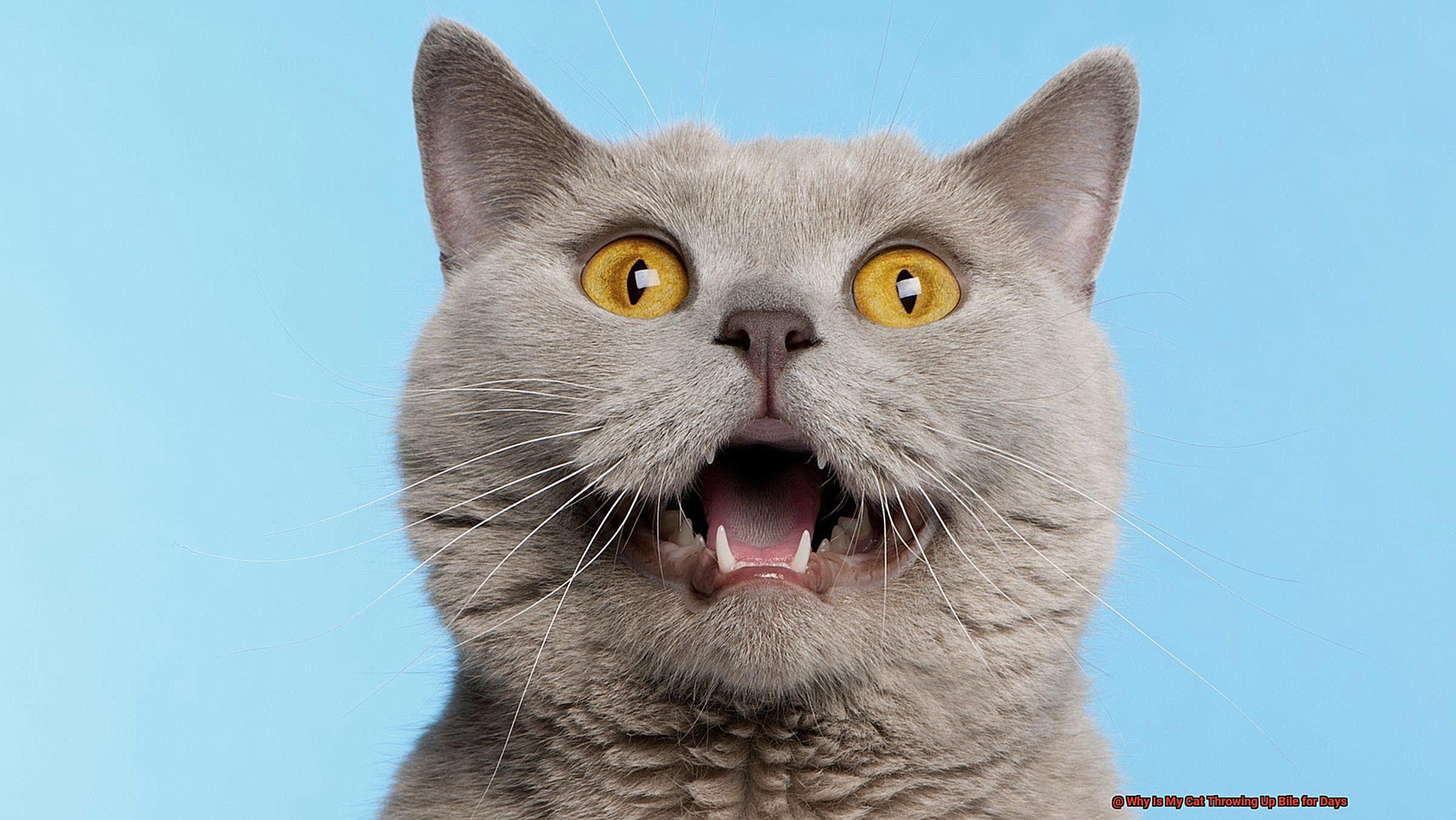
In some cases, additional diagnostic tests may also be necessary to determine the underlying cause of your cat’s vomiting.
If your cat is experiencing persistent vomiting or other concerning symptoms, don’t hesitate to seek veterinary care right away. Remember, early intervention is crucial to ensure your cat’s well-being.
Potential Complications of Cats Throwing Up Bile for Days
However, when your cat throws up bile for days, it can be concerning and even dangerous. There are several potential complications that can arise, including dehydration, malnutrition, and damage to the esophagus and stomach lining.
Dehydration is perhaps the most serious complication that can occur when a cat vomits frequently. Without adequate fluids, your cat’s body can quickly become weak and vulnerable.
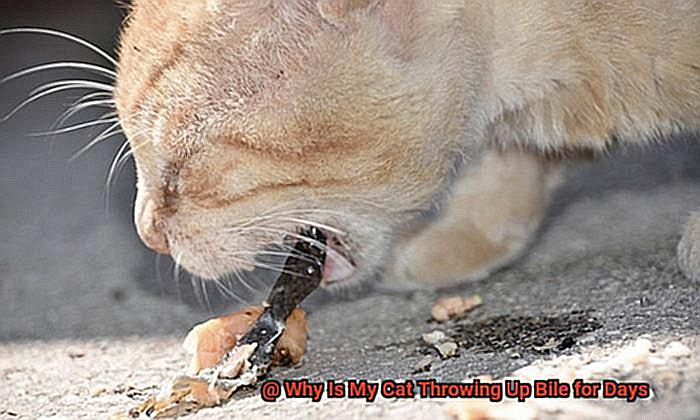
Signs of dehydration include dry mouth and nose, sunken eyes, and a lack of skin elasticity. It’s like a balloon that has lost its air – your cat needs fluids to function properly.
Malnutrition is another potential complication that can arise from prolonged vomiting. If your cat is unable to keep food down for an extended period, they may not be receiving the essential nutrients they need to stay healthy.

This can lead to weight loss, weakness, and a weakened immune system. It’s like trying to run a car without gas – your cat’s body needs fuel to function correctly.
Chronic vomiting can also cause damage to the esophagus and stomach lining. The acid in bile can irritate and inflame these areas, leading to gastritis. Symptoms of gastritis include vomiting, loss of appetite, and abdominal pain. It’s like having a constant burning sensation in your stomach – your cat needs time to heal from this kind of damage.
In some cases, chronic vomiting can be a sign of a more serious underlying condition such as kidney disease, liver disease, or cancer. It’s crucial to consult with a veterinarian if your cat vomits bile for an extended period to rule out any underlying health issues. Ignoring the problem could make it worse.
If you notice that your cat is throwing up bile for days, it’s important to monitor their behavior closely and seek veterinary care if it persists for more than 24 hours or is accompanied by other concerning symptoms such as lethargy or dehydration. Early intervention can prevent potential complications and ensure that your cat receives the necessary treatment to recover fully.
Prevention Tips for Avoiding Long-Term Vomiting in Cats
One of the most concerning issues you may face is when your cat throws up bile for days on end. This can be a sign of an underlying medical condition and should not be ignored. But what can you do to prevent long-term vomiting in your cat? Here are five preventive tips to help keep your cat healthy and happy.
Feed Your Cat a Balanced Diet
Providing your cat with a balanced and nutritious diet is essential for maintaining their digestive health. Choose high-quality cat food that meets their nutritional needs, and avoid sudden changes in diet that can cause digestive upset and lead to vomiting. If you need to switch your cat’s food, do it gradually over several days.
Ensure Access to Fresh Water
Dehydration can lead to digestive issues and vomiting, so it’s important to make sure your cat has access to clean and fresh water at all times. Encourage your cat to drink plenty of water throughout the day to help reduce the risk of vomiting.
Regular Exercise
Regular exercise is key to maintaining good digestive health in cats. Exercise helps to stimulate the digestive system and can also help to relieve stress and anxiety, which can contribute to vomiting in some cats. Encourage your cat to play with toys or climb a scratching post to keep them active and healthy.
Keep Your Cat’s Environment Clean
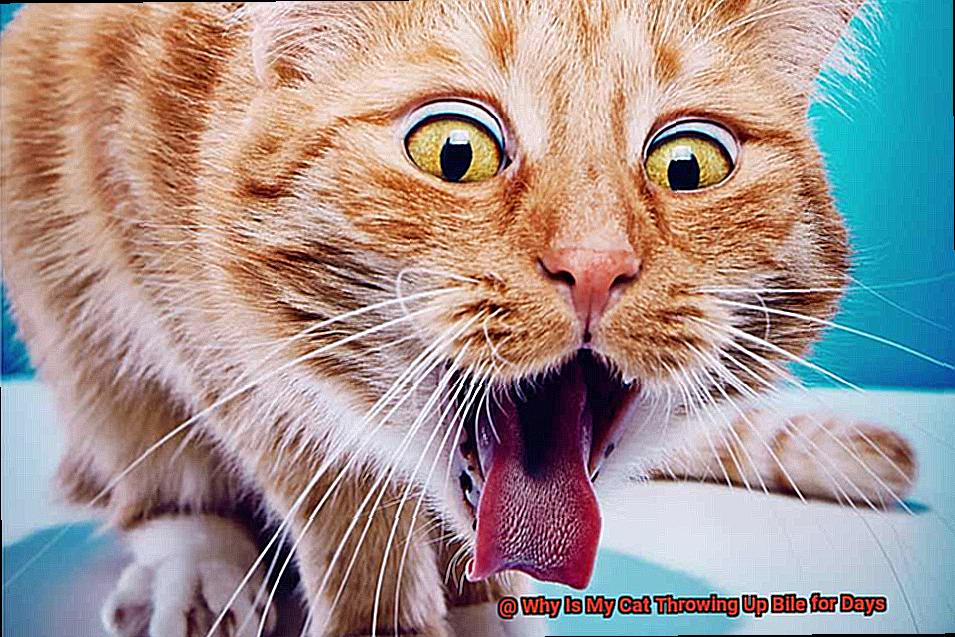
Keeping your cat’s environment clean and free from any potential toxins or irritants is crucial for preventing long-term vomiting. Remove any hazardous materials from your home, such as cleaning products or plants that may be toxic to cats. Regular cleaning of litter boxes and bedding can also help reduce the risk of bacterial infections that can cause vomiting in cats.
Monitor Your Cat’s Behavior
Cats are good at hiding their pain, so it’s important to pay attention to subtle changes in their behavior. Monitor your cat’s behavior and look for any signs of discomfort or distress. Regular vet check-ups can also help detect any underlying health issues that may cause vomiting. Early detection and treatment can prevent long-term vomiting.
In conclusion, preventing long-term vomiting in cats is crucial for maintaining their overall health and well-being. By following these preventive tips, you can reduce the risk of long-term vomiting in your cat and promote their overall digestive health. Remember, if your cat continues to vomit despite these measures, seek veterinary care immediately to identify and treat any underlying health issues.
vdU-jOI3Feo” >
Conclusion
In conclusion, if your cat is throwing up bile for days, it’s important to seek veterinary care as soon as possible.
This could be a sign of a serious underlying health issue that requires prompt attention. Additionally, you can try feeding your cat smaller and more frequent meals, providing them with plenty of fresh water, and avoiding sudden changes in their diet or routine.
With proper care and attention, you can help ensure that your feline friend stays healthy and happy for years to come.

